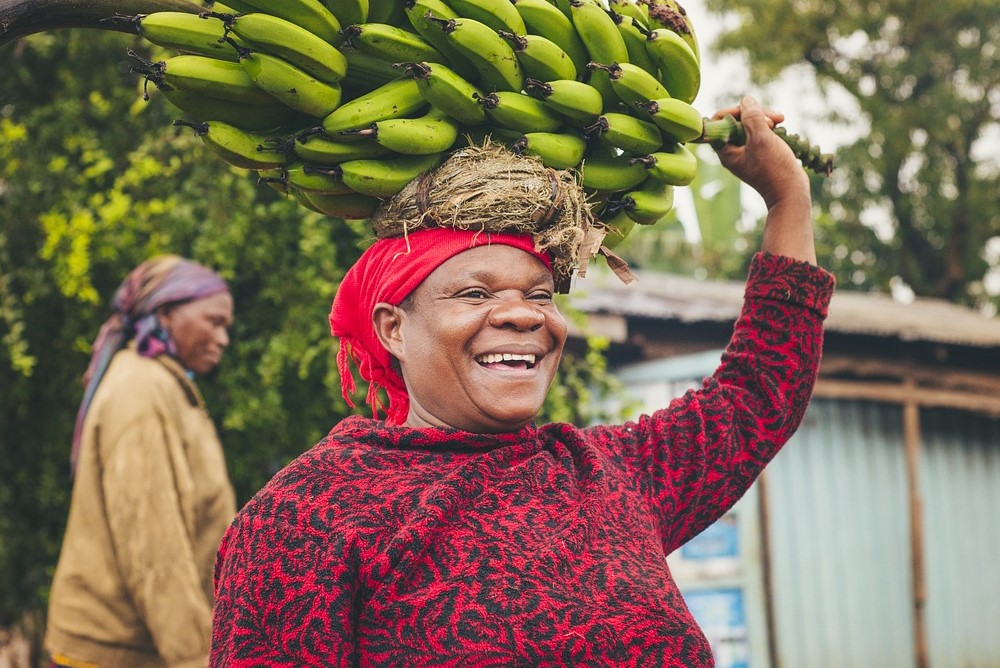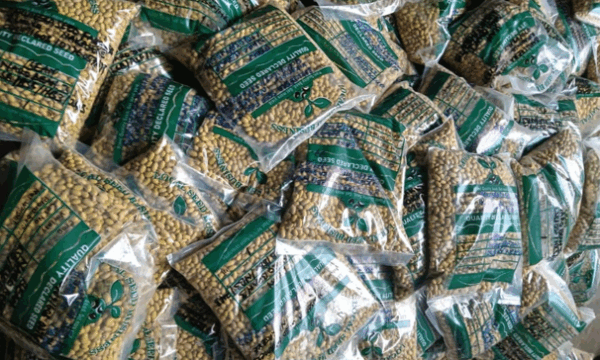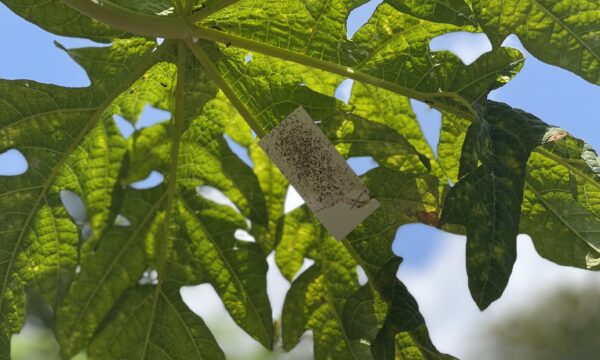
The CABI-led PlantwisePlus programme has been supporting smallholder farmers in Taita Taveta County, Kenya, with training on better banana agronomy which can help them increase their livelihoods, crop yields and food security.
PlantwisePlus works in partnership to help support low and lower-middle income countries to predict, prepare themselves for and prevent plant health threats in a changing climate. Through the PlantwisePlus Toolkit, for example, a range of digital products, help farmers grow crops more sustainably.
This includes CABI BioProtection Portal – a free tool to enhance the awareness and uptake of biocontrol and biopesticide products by growers and advisors – and the Plantwise Knowledge Bank and the Plantwise Factsheet Library app.
Tackling a range of crop pests and diseases
Scientists from CABI’s regional centre for Africa in Nairobi helped deliver a four-day training for smallholder farmers to help them tackle a range of crop pests and diseases of bananas including nematodes, moles, thrips, banana weevils, cigar end rot and panama disease.
Over 50 million people in East Africa depend on highland bananas for their food and/or income. Annually, the crop’s production is worth around $4.3 billion, However, pests and diseases, nutrient deficiencies and drought stress continue to affect average productivity of banana.
The sessions, which were held together with the Micro Enterprise Support Programme Trust (MESPT) who are running a banana project under the Danish partnership programme Danida Market Development Partnerships (DMDP), focused on Integrated Pest Management (IPM) strategies for banana but also tomato and general pest management.
In this program, MESPT uses Business Service Providers (BSPs) who oversee farmers’ activities. The BSPs are clustered into estates with a defined number of farmers under them. The main role of the BSPs is to train and follow-up farmers to ensure the adoption of different technologies and train farmers in planting and general agronomic practices.
The organisation is also working with 12 lead farmers who have established demonstration farms which are used to train other farmers on different technologies and how these can help keep pests and diseases at bay.
Safe use of pesticides and KS1758 standard
The event – held in Taveta town – was attended by 44 Business Service Providers, lead farmers and agronomists from MESPT. The trainees also gained valuable insights on safe use of pesticides and how to meet the KS1758 standard-Horticulture Code of practice focusing on fruits and vegetables.
Meanwhile, tomato is one of the most important vegetables grown in Kenya and plays a critical role in income generation and creation of employment for both rural and urban populations, in addition to meeting food nutritional requirements.
However, since it was first reported in Kenya in 2014, the tomato leafminer (Phthorimaea absoluta) has become a serious threat to the sustainable production of tomato in Kenya with nearly 98% of tomato farmers affected.
It has become invasive in introduced ranges having escaped the biotic constraints, which keep their populations in check in their regions of origin. Infestation by this pest can cause yield losses of up to 100%.

On the first day of the training, Peter Karanja, Assistant Training Officer – PlantwisePlus, delivered a session on banana and tomato pest management for the BSPs and lead farmers. This included the demonstration of bio traps – such as the TutaSan pheromone trap and the Delta trap – as well as insect sticky cards used as part of an IPM strategy.

Mr Karanja also spoke about the ‘Ukulima True’ campaign which has been launched – in collaboration with the CBCC (Centre For Behaviour Change and Communication) and the Department of Agriculture, Nakuru County, to help reduce the risks to farmers, consumers and the environment from chemical pesticides.
Samples of biopesticide products were also on display. The trainees were shown how to navigate through the CABI BioProtection Portal to and the Pest Control Products Board (PCBP) website to find biopesticides available and registered for use in Kenya.

Day two of the training saw Mr Stanley Mruu Nganga, Regional Manager, PCPB, Coast Region, talk about the safe use of plant protection products. This included looking at pesticides and why they are regulated by the government as well as the safe purchase, transport, and storage of pesticides.
He also emphasized the importance of reading the pesticide label, use of personal protective equipment during mixing and spraying as well as the correct dosage. These are key topics in the KS 1758-Horticultural code of practice.
Importance of soil and substrate management
To close the training on day three and four, Mr Patrice Ngenga, a KS 1758 trainer from the Fresh Produce Exporters Association of Kenya (FPEAK), spoke about the KS1758:2016-Horticulture code of practice. The KS1758 is a Kenyan horticultural code of practice that is anchored on 4 pillars Food safety, Environmental sustainability, Worker Health and safety and Plant Health. This code applies to procurement of inputs, production and placement of horticultural produce in the market. The topics covered by Mr. Patrice included the importance of soil and substrate management, cultivation, soil erosion, soil fumigation and site selection.
He also emphasized on aspects of irrigation and water management, fertilizer usage and sanitation for propagation materials.
The BSPs are expected to pass the valuable trainings to the farmers they are serving. CABI in collaboration with MESPT hopes to further capacity builds the BSPs and lead farmers to help bridge the extension gap. It is hoped that moving forward, a good number of BSPs and lead farmers could be trained as plant doctors. These staff, once trained, will be expected to operate PlantwisePlus plant clinics where smallholder farmers can take samples of their plant health issues for diagnosis and advice on treatment.

Additional information
Main image: Pests and diseases, nutrient deficiencies and drought stress continue to affect average productivity of banana in East Africa including Kenya (Credit: Pixabay).
See also the past project ‘Improving banana agronomy practices for small scale farmers in East Africa’ and the story ‘Initiative launched to help reduce risk of pesticides to farmers, consumers and the environment in Nakuru County, Kenya.’
Related News & Blogs
Training Sri Lanka’s agro-dealers in pesticide risk reduction
Agro-dealers provide vital support to Sri Lanka’s farmers. These agricultural input suppliers are often the first point of contact for smallholders who need advice on plant protection products. However, agro-dealers often lack formal training in safer…
3 July 2025




